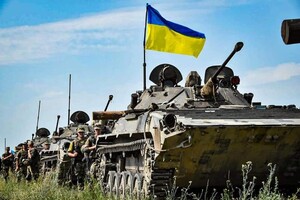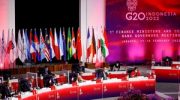The West is not sure if it wants Vladimir Putin to lose.

The latest wave of Russian threats to use nuclear weapons and to further reduce the supply of energy carriers has so far not scared off Ukraine's allies in the US and Europe, only strengthening their will to win over Kyiv.
What they are not sure about is whether they want to they want Vladimir Putin to lose, Bloomberg writes.
Joe Biden on Thursday brought tensions to the fore by warning that the Russian president's nuclear threats may not turn out to be a bluff, as other rescue options his incursions into Ukraine are narrowing.
“We are trying to understand what is Putin's way out? Where will he get off? Where will he find a way out?” the US president asked on Thursday in New York. “Where can he be in such a position that he not only does not lose his identity, but also does not lose significant power in Russia?” the annexation of the occupied Ukrainian lands and redoubled his desire to fight, ordering the call-up of at least 300,000 reservists, despite discontent within the country.
“Putin is actually setting new conditions,” says Oleksiy Makarkin, deputy head of the Center for Political Technologies in Moscow. – We have practically no room for maneuver.”
One European official compared Putin's situation to a cornered animal that becomes more and more dangerous the more he traps himself.
>
At the same time counteroffensive of Ukrainehas recaptured thousands of square kilometers of territory once controlled by Russia in just a few weeks, fueling Kyiv's ambitions to push Moscow's forces even further, perhaps beyond the borders they occupied before the February 24 invasion.
The more progress they make , the greater the danger of such a defeat that Putin will not be able to accept.
American and European officials say they do not see much prospect in the recently mobilized Russian forces, which lack sufficient motivation and training and equipped with limited equipment, will allow Putin to stop the advance of Ukraine.
But they also don't see a quick victory and are resisting Kiev's demands for longer-range weapons to speed up that outcome.
With only weeks to go before the winter cold sets in, complicating hostilities, American and European officials fear that the war may drag on, and Russia will not be able to regain the initiative, but is ready to spend a huge amount of troops and equipment to slow down the advance of Ukraine. Some believe that Kyiv will be able to push Moscow's troops back by next summer.
Ukrainian officials say the success of their counteroffensive so far shows they will be able to push Russian forces out of most of the territory occupied since the February 24 invasion within 3 to 6 months if arms shipments from the US and its NATO allies continue.
The successes on the battlefield have so far intensified calls for the return of all territories lost to Russia, including Crimea, which Putin annexed in 2014.
In Moscow, some officials hope that the resolve of Europe and the United States will weaken under the pressure of energy problems and the rising costs of supporting Ukraine. But behind public displays of confidence that the mobilization will allow Russian forces to resume the offensive within a month or two, some insiders admit that the most the Kremlin can hope for now is a protracted conflict that will last years with periodic flare-ups.
< p>The prospect is fueling fears on both sides that Putin may decide he has no choice but to escalate further, with even larger strikes on Ukrainian power plants and other civilian targets, or the use of chemical or nuclear weapons.
Read also: The Guardian: Ukraine has regained territory and support, but Russia will continue to test the West's mettle .
Putin can be “pretty dangerous and reckless” when he “feels he's got his back up against a wall,” William Burns, director of the US Central Intelligence Agency, said in an interview with CBS this week. The Russian leader is operating on a “false assumption that he thinks he can stand up to the Ukrainians, the United States and the West.”
Former US national security adviser John Bolton publicly called for “regime change” this week, saying that Putin should go. But some European officials fear that his replacement will be even tougher.
The uncertainty is also compounded by the fact that although Putin is very strict in his words about his red lines, he does not always back them up with actions. Some territories that Putin declared Russian “forever” after the annexation have already been returned by the Ukrainian military, prompting fierce criticism in state media of the Kremlin's actions.
Despite warnings that attacks on Crimea would trigger massive retaliation , Putin did not go for a sharp escalation after Kyiv carried out a series of strikes on military facilities on the peninsula in the summer. And Russia has so far tried to play down the scale of the attacks on Ukraine's border areas, sometimes calling the explosions “loud noises” to avoid having to acknowledge hostilities on its territory.
A larger-scale defeat in Ukraine would be too serious for Putin to allow hide her “The Russians will not understand this,” said Makarkin, a political consultant.
Related video
We will remind you that on the morning of October 8, a truck exploded on the Crimean bridge. Two bridge spans and a railway overpass were damaged.


